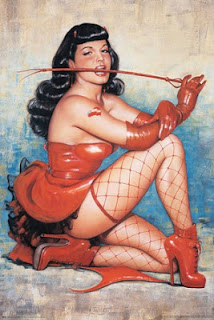There is a general perception that our genre is an embattled one, unfairly ostracized and intellectually snubbed for the explicitness of what we write and the sexual arousal that our texts seek to invoke in the reader.
But it is not entirely fair to lay the cause for all the derision layered upon the genre at that door alone. Nor is it useful, since you and I are not going to stop writing erotic literature, and the Western world is (GOP convention aside) becoming more and more inured to the shock of sexual explicitness. We have a generation of teenagers growing to adulthood who’ve been watching porn on the net for years. I’ve just finished the first season of Spartacus, which has, I’m convinced, set off a new craze for fucking up against walls.
A serious and completely resolvable part of why we’re looked down upon has to do with the quality of writing pervading the genre. Remember that a huge number of readers meet their first erotica on blogs and listserves and other places where no editorial oversight takes place. The quality of much of our published work is certainly no worse than a lot of bestselling thrillers, which is neither a boast nor a criticism. But then, the thriller genre doesn’t have the added challenge of overcoming social stigma as well.
One of the best ways we can hope to raise the standard of writing in this genre is by critical engagement with the work. As givers and receivers of clear, fair, constructive criticism.
Most people fear criticism. They have a very hard time separating themselves from their work. This is especially true for erotica where much of the subject matter may be partially autobiographical or may hint at the writer’s own sexual tastes. I don’t have any pat solutions for this. I think only time and acclimatization take away the sting of a rough crit or review.
But I’d like to ask you to think of it another way. Wholly positive and laudatory crits or reviews of your work will never make you a better writer. They may make you a more confident human being, but that shouldn’t be the business we are in here. We should be in the business of improving our craft and the genre as a whole, not nurturing the egos of our fellow writers.
Critiques and reviews are two different things, and I’d like to make those differences clear. A critique is done upon an unpublished work where changes can be made to the text before publication. A review is a response to an already published work, which will not, usually, be subject to change.
Critiques
Critiques are a cooperative process embarked upon with a view to making the work stronger. The target audience for a critique is primarily the writer, and sometimes other writers who read it and identify mistakes that they also make. Finally, critiques are a strong learning tool for the critiquer, because you can often see the flaws in the writing of others that you find hard to see in your own. But the process teaches you how to look for those flaws in your writing later.
Critiques should point out both the weaknesses and strengths in the writing. They can be as practical as finding spelling, typing and grammar errors, address issues of voice, style, POV, characterization, motivation, plot structure, poetics, believability and realism, and, to some extent, intended meaning.
Subject matter is not the purview of a critique. What I mean by that is, if heavy BDSM generally offends you and you feel that you cannot see past that to read the work with a modicum of objectivity, you have no business critting it. On the other hand, if you find the subject matter so arousing that you cannot overcome your wholly positive feelings, then, again, you’re probably not the right person to give the piece a strong critique.
In any case, it is always polite to start a crit by owning any factors that might cause your criticism to be overly subjective. “I loved this story and found it so erotic, I’m not sure if I was able to give it the critical eye it deserves,” or “I’m afraid that I’ve always found watersports profoundly disturbing, so what I have to offer might be coloured by that limitation.”
There is no such thing as a wholly objective criticism, but we have a framework of solid aspects of good story structure and good writing practice to help us be as objective as possible.
In giving a crit, you are entering into a partnership with the writer, where the shared goal is to make the work the best it can be. It isn’t a kindness to overlook errors with a view to nurturing a new writer. It gives them a false sense of security that will, inevitably, be blow apart at a later date, to their dismay and you won’t be there to take part of the pain. It’s not nice to set someone up for an ambush, which is exactly what you’re doing.
Finally, offering solutions to problems in the work can be problematic. For beginners, it can be very helpful because they don’t yet have the craft to figure out how to fix the problem themselves. For more advanced writers, an offer of a solution can sometimes seem like an offer to re-write their work and appropriate their story. On the other hand, I always like them, and will sometimes ask for them. There are multiple was to solve a problem and the more I know, the wider my options are.
Taking criticism is as much an art as giving it. There are a number of things it is good to keep in your mind: the person giving you the crit is doing you a service that is entirely voluntary and aimed at allowing you to produce a better piece. Even if you disagree entirely with their critique and implement none of the changes suggested, you need to acknowledge that this person is a reader. Their reaction is a reaction to your text. So if they have ‘misread’, you need to acknowledge that other readers might, too. Yes, of course, all texts can have multiple readings, but if your critiquer’s reading strays too far from your intended meaning, then there is a problem you need to fix.
Yes, all critiques are subjective, but so is your writing, and so is a reader’s reading. We are in the very business of eliciting subjective reactions in readers, so not all subjectivity makes a criticism invalid. And positive subjective readings can be – in fact, usually are – far more misleading than negative ones. Positive feedback is wonderful, but it doesn’t actually improve your work. And that’s what you’ve gone into the process to do, isn’t it?
Ultimately, the writer is responsible for their work. It comes out under their name. So the choice to take and implement any given criticism is yours. It is very hard for another writer not to want to read something the way they would have written it. It’s just the nature of the beast. As a receiver of a critique, you need to decide what to keep, what to change, based upon a voice that is true to you.
Reviews
Reviews should not be aimed at the author. The target audience is potential readers of the work, or readers who have already read it and want to compare their reading experience with the review. Both are equally rich interactions with the work.
There are a lot of shoddy reviews out there, and I’m not particularly skilled at them myself. But the basic aim of a review is to contextualize the published work for a reader, give them some options for how to approach it, highlight elements that the reader might miss. The point of it is to enrich the reading experience, not to ruin it.
Often good reviews will survey a particular author’s work in the context the author’s entire oeuvre, or they may address it the context of other works within the genre. Rarely does a review address the novel in its entirety. Once past the short synopsis, reviewers will pick out and discuss the dominant themes in the novel. But I’ve seen amazing reviews that only addressed the writer’s use of poetics, or archetypal characters. A review of a book doesn’t need to be everything to everyone
Any review that starts with “I hate BDSM and I hated this BDSM novel” is not really a review at all. Similarly, “I don’t usually read m/m romances and now I know why,” is a sign that the reviewer did not approach the novel with an open mind. One of the reasons why many of the recent literary reviews of Fifty Shades of Grey are so illegitimate is because they off by stating that they don’t think explicit sex has any place in a novel.
If you’ve never written a review of erotica, I urge you to consider doing it. The rise in the phenomenon of the user-review and its varied implications is a topic too long for this already huge post.
However, before you give your writer-friend five stars and a glowing review because she’s your friend and you love her and she wants to sell her books, please consider the cumulative consequences of doing so. It does not serve our genre, and doesn’t encourage excellence in writing. There is no such thing as a perfect book, and so there should be no such thing as a perfect review.
Solid critical reviews are a tremendous compliment to the author. Someone has taken the time to truly care about your work and deep-read it. No author should be upset that someone has pointed out the flaws in their book. Every book has flaws. And having a reader know what they are in advance will often lessen the impact of them. “Well, the character of the husband is weak, but I knew that was going to be the case. Read on.”
Our genre desperately needs us to take it more seriously. We need solid criticism and robust reviews. We need to believe that we are strong enough to take them, and to stop thinking that every negative criticism is going to imperil our existence. It won’t.
But, most of all, we need to believe we are worthy of being treated as equals within the larger literary community.












